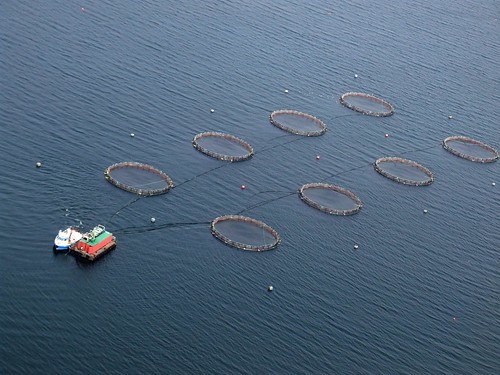Industrial food model and soy-based aquaculture a disaster for fish, environment
Agribusiness behemoths including Monsanto and Cargill are set to cash in big from industrial fish farming or “aquaculture” as the soy industry spreads its reign to the seas, a new report from environmental and consumer watchdogs shows.
The new report, “Factory-Fed Fish: How the Soy Industry is Expanding Into the Sea” from Food & Water Watch and Food & Water Europe, shows how the use of soy as feed in aquaculture -- branded as "sustainable" -- is an environmental disaster, harming fish both wild and farmed as it pollutes the oceans and brings unknown effects to consumers eating the soy-fed fish.
“Our seas are not Roundup ready,” said Wenonah Hauter, Executive Director of Food & Water Watch, referring to the 93 to 94 percent of soybeans produced in the United States that are genetically modified by Monsanto to tolerate the application of its Roundup herbicide.
The growing of Monsanto's soy has led to an increase in the use of herbicides, the report states, and its planting on large scales has led to massive deforestation, which exacerbates climate change and displaces indigenous communities.
“Soy is being promoted as a better alternative to feed made from wild fish, but this model will not help the environment, and it will transfer massive industrial farming models into our oceans and further exacerbate the havoc wreaked by the soy industry on land—including massive amounts of dangerous herbicide use and massive deforestation,” stated Hauter.
Once grown, the soy feed continues its adverse effects. Not being the natural food for fish, the farmed fish excrete more waste, which pollutes the open waters. In addition, some of these soy-fed fish will escape and breed with wild fish, affecting natural populations. Excess feed will escape as well, causing unknown damage to wild populations.
Despite these risks, soy has been touted as a more ecologically-sound alternative to feed in aquaculture, notably by the American Soy Association.
According to the report, "the rising use of soy in fish farming industries will mean that notorious agribusinesses like Monsanto, which has sponsored feed trials with genetically modified soy and salmon, and Cargill, which has an aquaculture feed division, will play a hand in seafood production." The report notes that half of the seafood consumed globally is through aquaculture, creating a potential gold mine in profits for these companies.
'庫間 > 해외자료' 카테고리의 다른 글
| 몬산토는 자신의 수익을 개선했다... 농업이 아니라 (0) | 2012.07.06 |
|---|---|
| GM은 세계 기아에 대한 해결책이 아니다 (0) | 2012.07.05 |
| 유기농 토마토가 관행농의 것보다 더 많은 산화방지제를 함유한다는 연구 (0) | 2012.07.05 |
| 가족농, 의식 있는 소비, 생태적 유익성: Bev Eggleston과 인터뷰 (0) | 2012.07.05 |
| Parque de la Papa: 안데스의 감자 다양성 보존 (0) | 2012.07.05 |
